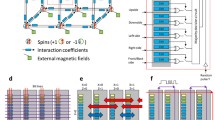Abstract
The energy consumed by computations is becoming an increasing concern both within the context of high-performance systems well as embedded systems, on par with the past focus on raw speed or its derivative performance. In this talk, we will outline a novel framework for designing and analyzing algorithms wherein the figure of merit is the energy complexity – a measure of the (physical) energy consumed. Using the formulation of an energy-aware switch, and a network of such switches, fundamental limits will be established for the energy needed for switching deterministically, as well as energy savings derived from probabilistic switching, with a probability of being correct, p. Specifically, it is shown that a single deterministic switching step for computing a BIT consumes at least (.(κ.T ln(2))) Joules of energy, whereas the energy consumed by a single probabilistic switching step to compute a PBIT can be as low as (.(κ.T ln(2p))) Joules. These results are developed within the context of an idealized switching device introduced here, constrained by the laws of classical (statistical) thermodynamics (of Maxwell, Boltzmann and Gibbs), as well as by the constraints of idealized semiconductor devices. Based on this notion of switching, models for algorithm analysis and design, as well as upper- and lower- bounds on energy complexity and hence, for the first time, asymptotic energy savings via the use of probabilistic computing will be established. Possible approaches to realizing these probabilistic switches using conventional CMOS technology, as well as their potential for accelerating the current semiconductor roadmap that is based on deterministic computing, including the projections implied by Moore’s law, will be outlined. This work draws upon basic concepts from computer science, microelectronics and classical thermodynamics, and in the interest of being self-contained, the presentation will include a brief survey of the relevant thermodynamics.
Access this chapter
Tax calculation will be finalised at checkout
Purchases are for personal use only
Similar content being viewed by others
Author information
Authors and Affiliations
Editor information
Editors and Affiliations
Rights and permissions
Copyright information
© 2003 Springer-Verlag Berlin Heidelberg
About this paper
Cite this paper
Palem, K.V. (2003). Energy Aware Algorithm Design via Probabilistic Computing: From Algorithms and Models to Moore’s Law and Novel (Semiconductor) Devices. In: Pinkston, T.M., Prasanna, V.K. (eds) High Performance Computing - HiPC 2003. HiPC 2003. Lecture Notes in Computer Science, vol 2913. Springer, Berlin, Heidelberg. https://doi.org/10.1007/978-3-540-24596-4_23
Download citation
DOI: https://doi.org/10.1007/978-3-540-24596-4_23
Publisher Name: Springer, Berlin, Heidelberg
Print ISBN: 978-3-540-20626-2
Online ISBN: 978-3-540-24596-4
eBook Packages: Springer Book Archive




